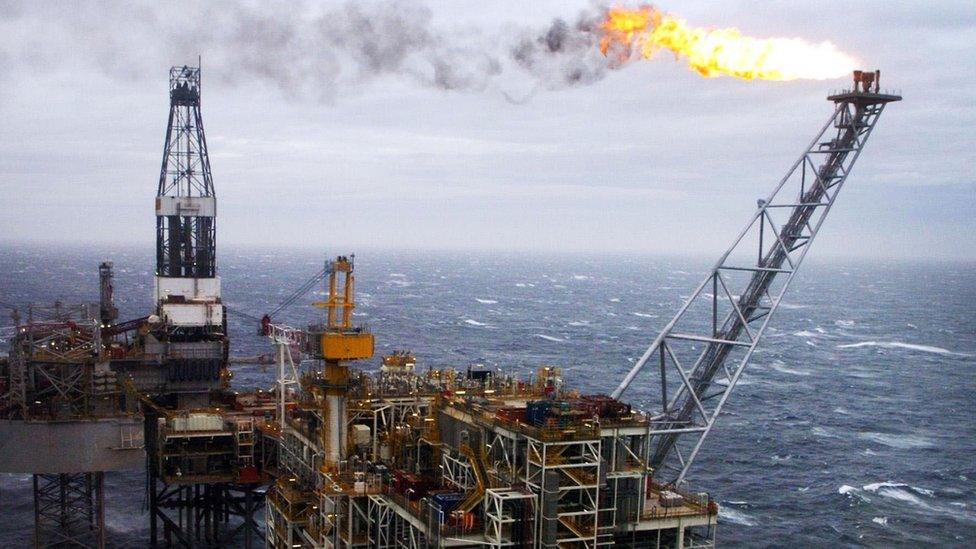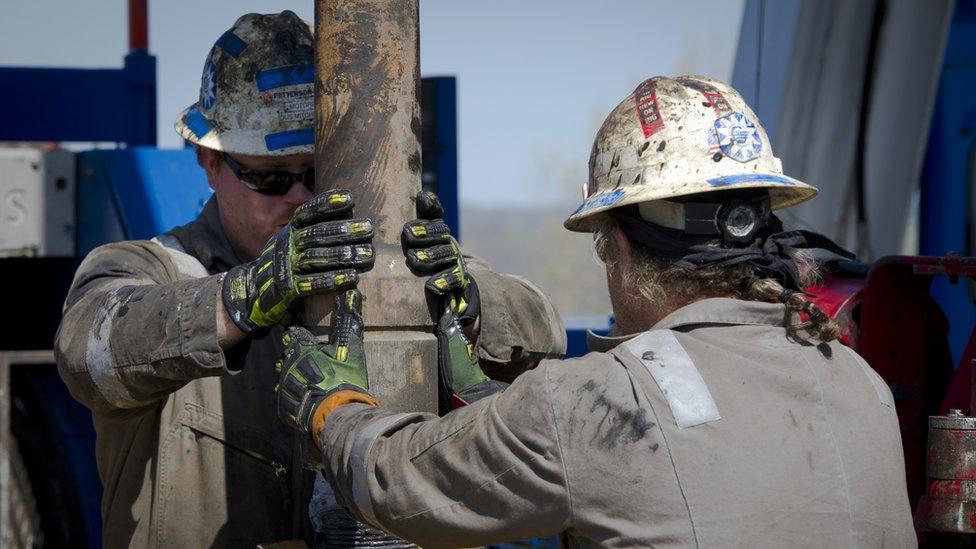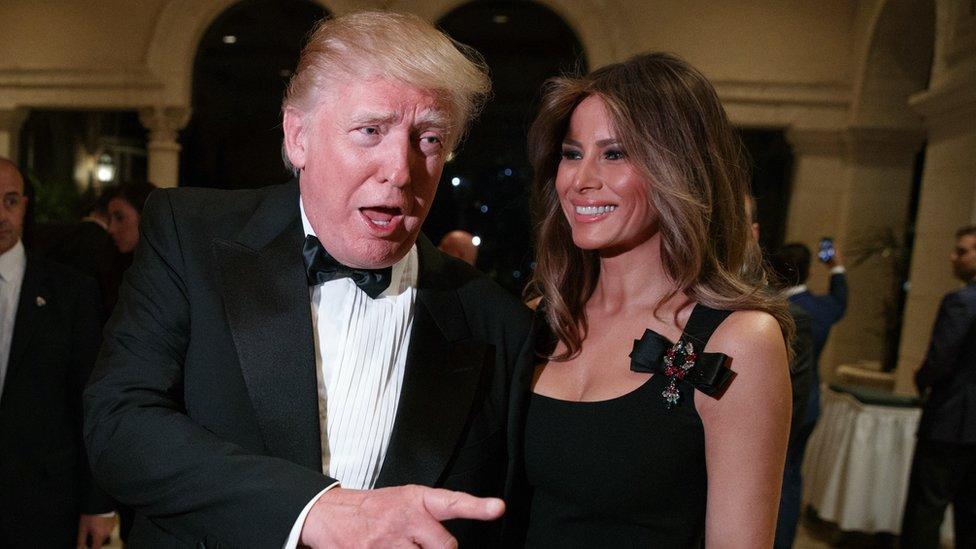2017 headwinds and tales of the unexpected
- Published

An aged 2016 is drawn by a New Yorker cartoonist, shambling out of what Americans like to call a non-gender-specific comfort station, where a toddler 2017 awaits its turn. "I'd give it a few minutes, kid," says the ol' guy.
Well, we've had a few minutes. The pungent whiff of 2016 is still with us, and 2017 is already shaping up as expected - in that it's going to be full of the unexpected.
Four days in, we're told by pay inequality campaigners that not only is the gender gap proving resistant to decades of legislation, but that the top bosses of the top firms have already trousered more pay than the median UK worker will earn all year.
Pay inequality is just one of the causes we can expect to hear more about in 2017, as real earnings come under pressure from inflation. I'm not going to make any rash predictions, but here are some economic issues to watch.

Inflation
Let's stick with prices. The official estimate of eurozone prices has come in at 1.1% in the year to December. That's not high or worrying, but it is a rapid increase in pace from 0.6% for November.
That shows that there are pressures building, notably in worldwide energy costs. The OPEC deal on output five weeks ago has pushed up oil prices to more than $55 per barrel. In early 2017 trading, it went above $58.
But there are other pressures on eurozone prices, including food. So from a sterling zone perspective, it's not just the weakness of sterling that's driving up prices. But that stands out as the surefire prediction for 2017.
Having lost nearly 20% of value against the US dollar, sterling prices of imports are going to rise. Many suppliers and retailers have delayed that since the pound plummeted in June following the Brexit vote. They have been able to do so through having hedged against currency changes, but those hedges are time-limited.
There's also the possibility of continued currency volatility. The pound gained some ground later last year, but has fallen against the US dollar to trade only a cent or so above its post-Brexit low point of $1.21.
An early sign of an expectation of inflation are new figures from the Bank of England on household borrowing. That has returned to where it was before the credit crunch, rising to more than £1.5 trillion. There may be several reasons, but one is likely to be that consumers are using more credit to bring forward purchases that they expect to become more expensive later in the year.

Oil industry

Any optimism in the offshore industry should be of the very cautious variety
For more than two years, the Scottish economy has suffered from the impact of much lower oil prices. That has helped businesses and households as they've seen fuel costs drop. But the overall effect in Scotland has been a hit to the north-east energy industry, with shock waves felt across the country.
Last year began with very low oil prices, falling below $30, and some expectations Brent crude could go below $20. It didn't.
So there may be some cause for optimism about the oil industry staging a recovery. If so, for the offshore industry at least, it should be optimism of the very cautious variety.
If prices can be sustained in the $50 to $70 range, which seems to be what the OPEC cartel production deal is intended to do, then it could make more exploration and development drilling more attractive.
That is expected to be evident mostly in North American fracking of oil and gas, which can be much more price-sensitive than the expensive and relatively slow process of opening up offshore reserves. One indicator to watch is the 'rig count' of fracking equipment over the next two months. Last month saw the sharpest rise in two years, and that was before the OPEC deal sunk in.

Last month saw the sharpest rise in 'rig count' of fracking equipment in two years
Weir Group, one Scots-based engineering firm with its fortunes closely tied to the health of the fracking market, has seen its share price more than double in the past year, after halving over the previous year.
Other oil firms based in Scotland are looking ever more to export orders. The big offshore developments are far overseas.
If a higher price does attract more investment in new production, that increased supply will itself will put a dampener on the oil price. That's why it is not expected to go much higher - not this year, anyway.
(In a year in which I have already spotted media releases including the "leverageable", the Nordic bank SEB has offered a splendid bit of analyst jargon: "Curves are likely to move from deep contango to backwardation in 2017". That's not a move from Strictly Come Dancing, but a shift in futures price relative to spot prices.)

Brexit
Economics has rarely felt so political. The dominant theme of UK politics is almost certain to be the negotiations to exit the European Union. And the twin themes within that, of future trade relations and future migrating movement of workers, are very much about economics.
While there was little impact to growth or consumer spending in the months following the Brexit vote, confounding many of the expert predictions, those experts are more confident they'll get it right about 2017. They foresee a marked slowdown in growth, as lower investment feeds through, and inflation dampens consumer spending and confidence.
The effect on consumer spending is evident in low expectations of retail figures coming out of the vital Christmas and winter sales period, for which Next has kicked off the reporting season on a sour note. More on that over the next week.
The effect on business investment is less clear, with quite healthy UK figures on manufacturing and construction.
So what can we conclude about the Brexit effect in 2017? Not much, except that we should be prepared for the unexpected, and don't be surprised if the bumpy politics of negotiations feeds into bumpy business and economics.

Eurozone

Marine le Pen, of the Front National, has announced plans for a new national currency ahead of the French presidential election
While much attention is being paid to the Brexit proposal, due to be set out by Theresa May by the end of March, at least as important is the response from the other 27 members of the European Union.
And they have other complications on their minds, which again mean the political is deeply enmeshed in the economic. Getting the limelight in the French presidential election, Marine le Pen of the Front National, has announced plans to create a new national currency, and to re-denominate government debt in the new franc.
While the old eurozone tensions continue to grumble away at Italian banks and Greek austerity, French voters have the power to direct a populist missile at the of the heart of the euro project, which could transform the unity of the 27 and of the Brexit negotiations.
There could be a consolidation of anti-right voters to keep out Marine le Pen, as happened to the far right candidate for Austria's president. But there's a reasonable chance that will involve coalescing around a centre-right candidate with tough messages on migration, on culture, and in favour of free market economic reforms.
Dutch and German voters also go to the polls this year. Angela Merkel may be well placed to win another term in autumn, but it is not a year when we should expect to see her making sacrifices for the wider European project.

Trump

Donald Trump appears to have US companies dancing to his tune
So there are lots of unknowns so far. The biggest unknown takes the oath of office later this month in Washington. Donald Trump has no track record of governing, and a long track record of very radical plans for tax, infrastructure spending, immigration and trade.
A US infrastructure boost could give a lift to the global economy. But with one Tweet early on 3rd January, the President-Elect served notice on General Motors that he's going after the auto industry's use of Mexican manufacturing plants. It's unclear whether he follows through or not with a big fat tariff, or whether Congress would let him.
But Trump appears to have US companies dancing to his tune. General Motors was quick to point out that only a few of the Chevrolet models targeted by the President-Elect are actually made in Mexico. And within hours, Ford was announcing an abandonment of its $1.6 billion plan for a new Mexican plant, instead putting investment in new electric and hybrid vehicle production into the Trump-voting rustbelt of Michigan.
Watching very very closely is the administration in Beijing. Later this year, it will set out its next five-year period in office. Not much chance of an electoral upset there. But it is a time when the Chinese nationalist drumbeat is also likely to be at its loudest.
